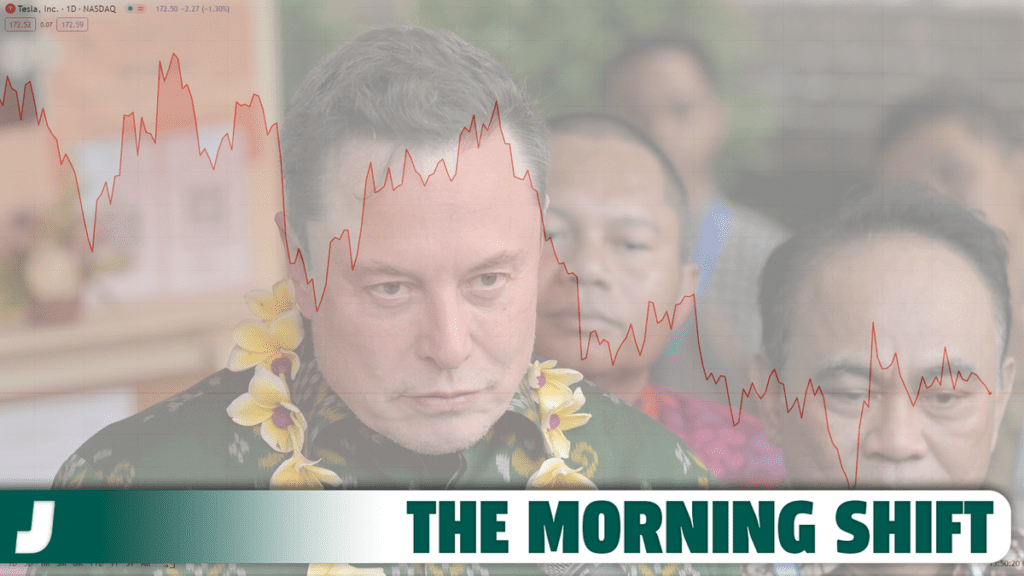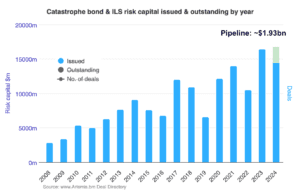Even Tesla’s Earliest Stock Supporters Are Giving Up Hope

Good morning! It’s Wednesday, June 5, 2024, and this is The Morning Shift, your daily roundup of the top automotive headlines from around the world, in one place. Here are the important stories you need to know.
Ultra Cruise is GM’s Answer to Tesla’s So-Called ‘Full Self-Driving’
1st Gear: Tesla Loses Some Very Early Supporters
Institutional shareholders at Tesla are dropping the automaker’s stock because they feel its days of huge growth are in the past. Tesla’s shares are down just about 30 percent this year, and the stock has fallen by over 50 percent since its high in 2021 whipping away nearly $600 billion in market value. Ouch.
Tesla and CEO Elon Musk have struggled as EV competition gets stronger on all fronts, causing sales to fall. The Austin, Texas-based automaker missed first-quarter expectations, and Musk has been wishy-washy on future products. From Reuters:
“It started to feel like the fundamentals were becoming detached from reality,” said John Belton, a portfolio manager at Gabelli Funds whose firm sold its entire stake of 65,900 shares – acquired in early 2022 – in the first quarter of the year. “We think the stock works best when there are auto company fundamentals that justify the stock price.”
Tesla’s nearly 14-fold increase in its stock the last five years has conditioned investors to hold on during periods of adversity and accept valuations that are more in line with technology companies than carmakers. This time however, even some of the company’s diehard believers have become skeptical that the same kind of expansion lies ahead and think Tesla’s shares have become too risky. Tesla did not respond to a request for comment on this story.
Of the 18 mutual funds tracked by Morningstar that have held Tesla shares since 2019, 10 reduced their positions in the last quarter, with four slashing their stakes by 15% or more, Morningstar data showed. Only five added shares.
That doesn’t mean Wall Street has written off the stock. Nineteen analysts tracked by LSEG now have either a “buy” or “strong buy” rating on Tesla, up from 17 in February. The average price target among 49 analysts tracked stands at $178.95, about 1.5% more than the stock’s closing price on Monday.
Not all investors see it that way. Ross Gerber’s investment first, Gerber Kawasaki Wealth & Investment Management, bought half a million shares over 10 years ago, but they have been steadily selling that position this year.
“I think the story is over, is the best way to say it,” said Gerber, who has whittled his position down to around 300,000 shares.
Gerber’s complaints range from Tesla’s public relations department, which he believes receives insufficient funding, to what Gerber calls Musk’s distractions by political and cultural issues.
“Over the last year and a half, Elon’s personal quests based on the way that he sees the world have superseded the interests of Tesla and its shareholders,” Gerber said.
Gerber believes the shares, which closed on Monday at $176.29, are fairly valued at $100, some 40% less than their current value, as long as Musk stays at the helm. He expects to give part of the remainder of his stock to charity to allay the tax consequences of selling, or use them to sell put options, which allows him to raise income without incurring tax penalties.
Despite all this, Tesla is still the world’s most valuable automaker with a $560 billion market cap. Second place is Toyota, the world’s biggest automaker by volume, at about $334 billion.
Tesla, however, trades at approximately 64 times future earnings, as of Tuesday morning, a multiple that exceeds the valuations of some tech high-fliers. Artificial intelligence darlings Nvidia, opens new tab and Super Micro Computer, opens new tab, for instance, trade at 37.8 and 23.2 times earnings, respectively. Other automakers are valued far more conservatively. General Motors, opens new tab trades at 4.7 and Ford, opens new tab trades at 6.4 forward earnings, while Toyota trades at 10.1.
Bullish investors justify Tesla’s valuation with a long list of reasons, pointing to its technology and fervent fan base. More recent causes for optimism have been the company’s continued push into fully-autonomous driving and in-roads into China.
“The Street is looking through this painful transition period for the long-term growth story to emerge for Musk & Co, with (self-driving) a key ingredient in that recipe for success,” said Dan Ives, an analyst at Wedbush Securities who has a $275 price target for the stock.
People who make a lot more money than I do seem to be really mixed on what will happen to Tesla’s stock. Listen, I’m not a stock expert, but uncertainty is never a good thing when it comes to Wall Street.
2nd Gear: GM CEO Says Customers Will Decide EV Transition
General Motors CEO Mary Barra reiterated the automaker’s electric vehicle transition strategy even as some shareholders questioned the market’s desire for EVs at GM’s annual shareholder meeting on June 4.
Barra said that ultimately, the composition of GM’s future lineup will be guided by customer demand. That does seem to be a bit of a backtrack from GM’s previous stance that all new vehicles would be electric by 2035. However, later that day, a spokesperson said GM is keeping that goal. Who knows what’s going to happen? From the Detroit Free Press:
Her comment came after a shareholder mentioned GM’s news last month, as first reported by the Free Press, that GM’s luxury brand Cadillac will likely not have an exclusively all-electric portfolio of vehicles by the end of the decade, which was an earlier target. Instead, it will continue to offer internal combustion engine vehicles, too.
“This is great news for many motorists who are not excited by EVs,” the shareholder told Barra referring to Cadillac’s change. “But is this just a temporary thing or will GM continue to resist the political pressure to impose electric vehicles on the public?”
Barra replied: “We have a great lineup of gas-powered, or what we call ICE vehicles, that are available right now and we have a great lineup of EVs that will continue to grow. We’ll be covering the portfolio from a segment perspective and arranged perspective of pricing, design, et cetera. So we believe we’re well-positioned and we will be customer-focused as we go through this transformation.”
The comment was later fleshed out in an interview with NBC when Barra said the automaker’s plan to turn its fleet all-electric will now play out “over decades.”
“We said back in 2018 that we’re committed to an all-electric future,” Barra told “NBC Nightly News with Lester Holt” on Tuesday. “But as we make this transformation, it’s going to happen over decades.”
May was actually the best sales month for EVs ever in North America, and that was also true for GM’s EVs. It was driven by ongoing growth for the Cadillac Lyriq, Chevy Blazer EV, GMC Hummer EV and Chevy Silverado EV.
GM is set to release its detailed sales report at the end of the second quarter on July 2.
3rd Gear: BYD, NIO Are Testing Automated Driving
Chinese automakers BYD and NIO are among the first automakers to get approval from regulators in the country to test out their automated driving technology on public roads. From the Wall Street Journal:
China’s Ministry of Industry and Information Technology said late Tuesday that it has approved a list of nine automakers, including manufacturers of trucks and passenger cars, whose automated driving technology can be tested on certain Chinese roads. BYD, NIO and Chongqing Changan Automobile are among those on the list.
The approval means the automakers can test automated driving functions in certain areas in approved cities. Seven cities were approved, including the biggest cities like Beijing, Shanghai, Guangzhou and Shenzhen.
However, the automakers still need to conduct test and safety evaluations before they can carry out actual testing on roads, the ministry said in a separate statement.
This is the first time that Chinese authorities have approved testing for level 3 and level 4 automated driving technologies in China. Both levels mean that cars can go beyond assisted driving and are able to do informed driving decisions with limited human intervention.
“Being able to test for L3 technology is the starting point of autonomous driving,” BYD said in a statement. The approval can hasten the application of automated driving technology, it added.
“It can help these automakers gather real road data in China for advancing their L3 and L4 auto-driving technology,” Bocom International auto analyst Angus Chan said.
The approval shows the government’s commitment to conduct larger scale of testing for automated driving in the country, Chan added.
Chinese automakers have apparently become extremely competitive when it comes to advanced driving tech this year. Their effort is being helped by the fact Tesla’s Full Self-Driving tech has not been approved for use in China.
4th Gear: Mercedes-Benz Recalls 15,000 EVs
Mercedes-Benz is recalling 14,912 electric vehicles in North America because an issue with the battery management system software could cause a total loss of drive power, according to the National Highway Traffic Safety Administration. That is, simply, not ideal. From Green Car Reports:
The recalled vehicles include all versions of the EQS and EQE sedans, as well as the EQS SUV and EQE SUV, from model years 2023 to 2025, depending on the variant. These vehicles may have battery management software that “might not meet current production specifications and may lead to a shutdown of the high-voltage system in specific situations,” according to recall documents.
That specific situation is a “diagnostic data overflow” to the battery management system. Other onboard control units might continuously send diagnostic requests to the battery management system, overloading its memory and triggering the opening of contractors that disconnect the battery pack from the powertrain.
The recall comes after an investigation from Mercedes following reports of warning messages in vehicle instrument clusters related to the battery pack, the first of which came from a dealership in Denmark in October 2023. The recall population was determined by production records; all other examples of the EQS and EQE sedan and SUV have software that “meets current production specifications” according to Mercedes.
Since a fix for the issue cannot be done in an over-the-air update, owners will have to schedule appointments with dealerships to have updated battery management software installed for free.
Reverse: lolol RIP BOZO
Neutral: This Sound Will Live With Me Forever
Listen To The Lexus LC500’s Glorious V8 Engine
On The Radio: Hozier – “Jackie And Wilson”
Hozier – Jackie And Wilson (Official Video)




